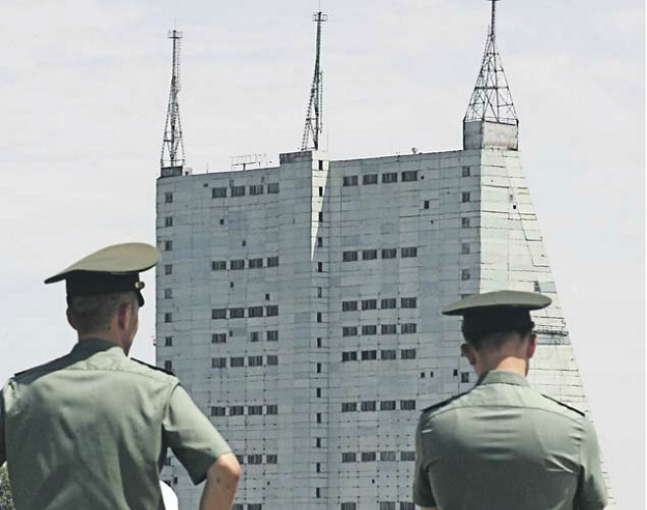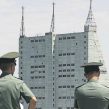
New Game in the Caucasus: Implications for Azerbaijan
Publication: Eurasia Daily Monitor Volume: 9 Issue: 161
By:

Following a summer lull, August 2012 became one of the most eventful periods for Azerbaijani politics, featuring several key developments, which may significantly affect the situation in the region.
First, after several months of negotiations and numerous visits of Russian delegations to Azerbaijan, it became clear that Russia plans to leave the Gabala Radar Station (GRS). Russian Deputy Prime Minister Dmitry Rogozin visited Baku in the first half of August. Although neither side revealed the official purpose of the visit, it became clear that the fate of the GRS was the main topic of discussions. Experts argued that Rogozin came to exert pressure on Azerbaijan’s establishment to prolong the radar station lease, which expires in January 2013. Although the public was scantly informed about the results of the meetings, it appears that the Russian side has already agreed to a withdrawal of its personnel from Gabala, and Rogozin’s visit was intended to clarify the timing and conditions of this withdrawal (Turan, August 17).
Later, Novruz Mamedov, the head of the foreign relations department within Azerbaijan’s presidential administration, stated that Baku is not against the prolongation of Russia’s lease of the GRS per se, but Moscow should better understand the host country’s regional prospective. “If Russia really needs [continued access to] the GRS and they want to cooperate, Azerbaijan would not object to it. However, this issue should be coordinated with a reality check,” he said. Moreover, Mamedov mentioned that the Gabala region where the GRS is located has great perspectives for tourism development, agriculture and other spheres, which are being hampered by the Russian military’s ongoing presence there (1news.az, August 19).
Political scientist Arastun Orujlu argued that Rogozin’s visit failed since he could not persuade Baku. Orujlu believes that Azerbaijan’s conclusion of gas agreements with Turkey to provide energy security for Europe worries Russia. Russian Duma Chairman Sergei Naryshkin and Foreign Minister Sergei Lavrov had visited Baku previously but were unsuccessful in changing its mind on the GRS lease. That is why the Russian establishment dispatched Rogozin whose mission was to threaten Baku. However, according to Orujlu, Azerbaijan had already crossed the point of no return with Russia (RosBalt, August 20).
A week after the failure of negotiations in Baku, Moscow began to concentrate its army in Dagestan’s Botlikh and Didoy districts bordering Georgia. Officially, the redeployment was justified as military operations against Dagestani militants. At the same time, however, the Russian military establishment reported on plans to conduct full-scale military exercises in occupied Abkhazia and South Ossetia. According to regional experts, as in 2008 before the war with Georgia, Russia is planning to conduct military exercises on the border with Azerbaijan and Georgia, and these exercises can be expected to result in some provocations along the border (Turan, August 20).
And, indeed, such a provocation took place. On August 29, the Georgian army clashed with a group of militants from the North Caucasus who crossed the Georgian-Russian border and took hostages. Georgian servicemen responded and killed 11 militants. In Baku, this escalation of the conflict was explained by Russia’s intentions to push militants from the North Caucasus into Georgia and Azerbaijan, who later may destabilize the political situations in these countries (Zerkalo, August 31). Signs of destabilization are already visible. On August 16, unknown assailants killed one and wounded six other worshippers in a Shia mosque located in Khasavyurt, Dagestan. The killed and wounded people were either citizens of Azerbaijan or ethnic Azeris who follow the Shia branch of Islam. Some experts believe that the incident was intended to send Baku a signal to not attempt to influence Shia communities throughout the Caucasus. The incident occurred just after the meeting of spiritual leaders of the North Caucasus who acknowledged the leadership of Baku-based Sheikh ul Islam Allahshukur Pashazadeh and the country of Azerbaijan as the religious center of the Caucasus (Turan, August 20). It is worth adding that one of the influential leaders of traditional Islam in Dagestan, Sheikh Said Efendi Chirkeisky, was also killed ten days after the shooting in the mosque.
An escalation of the conflict along Azerbaijan’s northern border also coincided with the continued cooling of relations with Iran. Moreover, in mid-August, US Congressman Dana Rohrabacher (R-CA) sent a letter to Secretary of State Hillary Clinton on the need to support the fight for the independence of South Azerbaijan from Iran and the possibility of this area’s unification with the Republic of Azerbaijan. In turn, Secretary Clinton rebuffed Representative Rohrabacher, saying that the United States supported the principle of territorial integrity (Azernews, August 28). Nonetheless, Congressman Rohrabacher’s proposal, when taken together with a recent initiative by an Azerbaijani MP to rename the Republic of Azerbaijan the “Republic of North Azerbaijan,” greatly disturbed the Iranian government.
Amidst all of this regional instability, NATO Secretary General Anders Fogh Rasmussen will visit Baku on September 6–7. According to official information, Rasmussen will discuss perspectives for further cooperation between the North Atlantic Alliance and Azerbaijan within the framework of the Individual Partnership Action Plan (1news.az, September 2).
All these events show that Azerbaijan is becoming the center of the major geopolitical games set to play out in the Caucasus. But unfortunately, it is difficult to predict whether Azerbaijan will be able to benefit or at least avoid being hurt by these upcoming tectonic geopolitical shifts.




